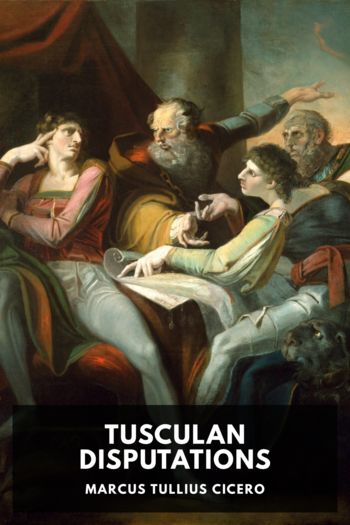Tusculan Disputations - Cicero (red novels TXT) 📗

- Author: Cicero
Book online «Tusculan Disputations - Cicero (red novels TXT) 📗». Author Cicero
Move slow, my friends; your hasty speed refrain,
Lest by your motion you increase my pain.
Pacuvius is better in this than Sophocles, for in the one Ulysses bemoans his wounds too vehemently—for the very people who carried him after he was wounded, though his grief was moderate, yet, considering the dignity of the man, did not scruple to say,
And thou, Ulysses, long to war inured,
Thy wounds, though great, too feebly hast endured.
The wise poet understood that custom was no contemptible instructor how to bear pain. But the same hero complains with more decency, though in great pain:
Assist, support me, never leave me so;
Unbind my wounds, oh! execrable woe!
He begins to give way, but instantly checks himself:
Away! begone! but cover first the sore;
For your rude hands but make my pains the more.
Do you observe how he constrains himself? not that his bodily pains were less, but because he checks the anguish of his mind. Therefore, in the conclusion of the Niptrae, he blames others, even when he himself is dying:
Complaints of fortune may become the man,
None but a woman will thus weeping stand.
And so that soft place in his soul obeys his reason, just as an abashed soldier does his stern commander.
The man, then, in whom absolute wisdom exists (such a man, indeed, we have never as yet seen, but the philosophers have described in their writings what sort of man he will be if he should exist); such a man, or at least that perfect and absolute reason which exists in him, will have the same authority over the inferior part as a good parent has over his dutiful children: he will bring it to obey his nod without any trouble or difficulty. He will rouse himself, prepare and arm himself, to oppose pain as he would an enemy. If you inquire what arms he will provide himself with, they will be contention, encouragement, discourse with himself. He will say thus to himself: Take care that you are guilty of nothing base, languid, or unmanly. He will turn over in his mind all the different kinds of honor. Zeno of Elea will occur to him, who suffered everything rather than betray his confederates in the design of putting an end to the tyranny. He will reflect on Anaxarchus, the pupil of Democritus, who, having fallen into the hands of Nicocreon, King of Cyprus, without the least entreaty for mercy or refusal, submitted to every kind of torture. Calanus the Indian will occur to him, an ignorant man and a barbarian, born at the foot of Mount Caucasus, who committed himself to the flames by his own free, voluntary act. But we, if we have the toothache, or a pain in the foot, or if the body be anyways affected, cannot bear it. For our sentiments of pain as well as pleasure are so trifling and effeminate, we are so enervated and relaxed by luxuries, that we cannot bear the sting of a bee without crying out. But Caius Marius, a plain country-man, but of a manly soul, when he had an operation performed on him, as I mentioned above, at first refused to be tied down—and he is the first instance of anyone’s having had an operation performed on him without being tied down. Why, then, did others bear it afterward? Why, from the force of example. You see, then, that pain exists more in opinion than in nature; and yet the same Marius gave a proof that there is something very sharp in pain for he would not submit to have the other thigh cut. So that he bore his pain with resolution as a man, but, like a reasonable person, he was not willing to undergo any greater pain without some necessary reason. The whole, then, consists in this: that you should have command over yourself. I have already told you what kind of command this is. And by considering what is most consistent with patience, fortitude, and greatness of soul, a man not only restrains himself, but, somehow or other, mitigates even pain itself.
Even as in a battle the dastardly and timorous soldier throws away his shield on the first appearance of an enemy, and runs as fast as he can—and on that account loses his life sometimes, though he has never received even one wound, when he who stands his ground has nothing of the sort happen to him—so they who cannot bear the appearance of pain throw themselves away, and give themselves up to affliction and dismay. But they that oppose it, often come off more than





Comments (0)